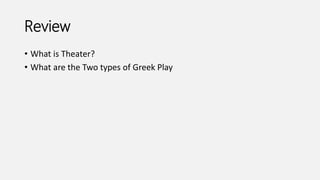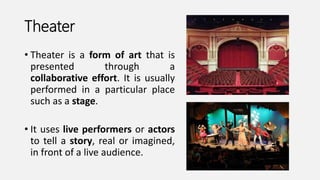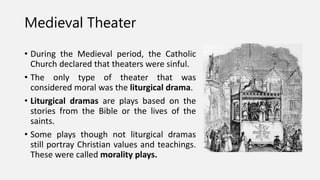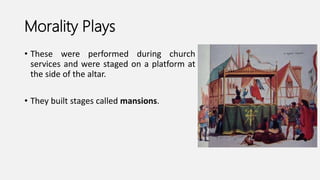Western Plays and Operas.pptx
- 1. Review • What is Theater? • What are the Two types of Greek Play
- 2. Theater • Theater is a form of art that is presented through a collaborative effort. It is usually performed in a particular place such as a stage. • It uses live performers or actors to tell a story, real or imagined, in front of a live audience.
- 3. 2 Types of Greek Play 1. Tragedy The tragedy is a play in which the main character goes through a series of events that lead to his or her own downfall or demise. 2. Comedy The comedy is a type of play in which life is represented in light and sometimes ironic episodes
- 4. Morality Plays Masques Liturgical Dramas Pastorals
- 5. Romantic Period Western Plays and Operas Western Plays and Operas
- 7. Medieval Theater • During the Medieval period, the Catholic Church declared that theaters were sinful. • The only type of theater that was considered moral was the liturgical drama. • Liturgical dramas are plays based on the stories from the Bible or the lives of the saints. • Some plays though not liturgical dramas still portray Christian values and teachings. These were called morality plays.
- 8. Morality Plays • These were performed during church services and were staged on a platform at the side of the altar. • They built stages called mansions.
- 9. Romantic Period Western Plays and Operas Western Plays and Operas
- 11. Renaissance Theater • Renaissance theater was more humanistic in its essence. • It centered more on the human existence rather than the religious learnings of the Medieval period. • It adapted from the culture of the ancient Greeks and Romans. • Theater of the period tackled issues of morality and the battle between good and evil.
- 12. Renaissance theater came in various forms such: • Masques were entertainment made for nobility and wealthy; theater performances included poetry, music, and dances.
- 13. Renaissance theater came in various forms such: • Comedies are plays that represented the ordinary life.
- 14. Renaissance theater came in various forms such: • Tragedies are plays that focused on the heroism of the character.
- 15. Renaissance theater came in various forms such: • Pastorals were plays that focused on love and romance in a country setting
- 16. Renaissance theater came in various forms such: • Intermezzi (singular: intermezzo) were the public version of the court masques. These plays were based on mythology and used a lot of symbolism.
- 17. Renaissance theater came in various forms such: • Street theater was a popular and inexpensive form of theater for the masses. Plays that were usually performed here were called Comedia Dell’arte. It also use wild, bawdy humor with slapstick comedy to entertain its audience
- 18. Romantic Period Western Plays and Operas Western Plays and Operas
- 20. Neoclassical Theater • The Neoclassical period mainly shows the development of the French theater. • The nobility and the court had a great influence on the visual arts and theater arts. • The public was entertained by staged comedies and tragedies
- 21. Neoclassical Theater • The Neoclassical period mainly shows the development of the French theater. • The nobility and the court had a great influence on the visual arts and theater arts. • The public was entertained by staged comedies and tragedies • The academies influence is also seen in theater arts. They, along with the nobility, imposed rules on theater.
- 22. Rules imposed by Academies and Nobility in Theaters Verisimilitude of realism • is the believability and plausibility of the play. It must be real. • Follow Aristotle's three unities: • unity in time, • Place; • and action. • It must be moral and uphold the convictions of the French academies, the nobility, and the Church.
- 23. Rules imposed by Academies and Nobility in Theaters Purity of the dramatic form •means the play should either be comedy or a tragedy; no combinations were allowed. Five-act form •means the play must be written in five acts.
- 25. Rules imposed by Academies and Nobility in Theaters Decorurn' means the characters should not be punished without o fair trial and should have been represented fairly with each character having good and bad traits. This includes the prohibition of vulgar words. Violent scenes like murder, suicide, etc., should happen offstage. The purpose of drama is to teach and to please.
- 26. Let’s define this words: Morality Plays Pastorals These are plays that not liturgical dramas still portray Christian values and teachings. These are plays that focused on love and romance in a country setting
- 27. Let’s define this words: Masques Liturgical Dramas These are entertainment made for nobility and wealthy; theater performances included poetry, music, and dances. These are plays based on the stories from the Bible or the lives of the saints.


























